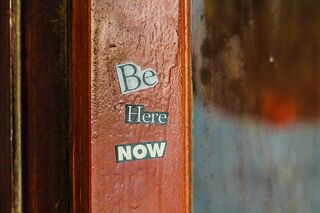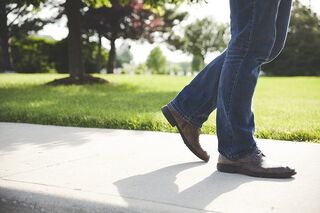Trauma
Be Where Your Feet Are
How to cope with life's difficulties, great and small.
Posted June 25, 2020

Oh, what a year it has been. Turbulence abounds, anxiety soars. We worry about our health and security, as well as the safety of beings throughout the world. Some of us have been confronted with the opportunity to wake up to our own hostility, greed, and abuse of privilege and power. We have put ourselves and our neighbors in jeopardy due to our short-sightedness, denial, and selfishness. For this, we must gather all the resources at our disposal (both external and internal) and make a course correction. It is our responsibility as stewards of our planet and our human family to do all we can do to find the North Star.
Months before the outbreak of the COVID-19 pandemic and the ensuing racial and economic upheaval, I wrote an essay about productive ways to approach life's difficulties. The essay was published in the Spring 2020 issue of the magazine, Womankind. I am sharing it now with my Psychology Today readers, as it is so applicable to the unexpected difficulties that have since come our way. Whatever your unique struggles may be and at whatever time you find yourself reading this article, I hope you find some helpful guidance here.
It is important to acknowledge the reality that difficulties, though sorely unwelcome, are an inevitable part of life. These difficulties may be mild or catastrophic, predictable or unpredictable, fair or unfair. Sometimes we can influence whether or not they come our way. But the truth is that we do not have the kind of control that we wish to have. No matter how careful, how responsible, how mindful we are, difficulties will come.

While we don’t always have a choice about whether or not difficulties come, we always have a choice about how we respond to them. We are not relegated to the backseat of the car as passengers, merely along for the ride. We are active participants with agency. In the how-we-respond-to-difficulties department, we are in the driver’s seat.
In my practice as a clinical psychologist, my patients often struggle with how to manage trauma, loss, and other kinds of physical and emotional challenges. Many feel that they are helpless victims of circumstance. Others feel powerless, trapped by the will and authority of others. A large part of our work together involves helping these dear ones reclaim their own power. We work to help them discover what they can do with the resources that they have.

Back in the beginnings of modern psychology, Sigmund Freud made an important observation that has stood the test of time. He noted that people can become psychologically immobilized in the grip of a great loss. Rather than being able to healthfully mourn the loss and move on, some people get mired in a depressive state that he called “melancholia." He could see that they experienced loss not only as loss in the external world but in the internal world as well. He described this experience so poetically when he wrote that the external loss “casts a shadow” on the internal world. He believed that there were two disasters that needed to be faced, the internal one far more powerful than the external one.
Over and over again, I have seen how our inner attitude profoundly impacts how well or how poorly we cope with external difficulties. I have found that one particular attitudinal shift can make a big difference. It is enormously helpful if we focus our attention on the present moment as best we can.
When coping with an external trauma or loss, it is very easy for the mind to be drawn to the past. We pine for what was that can never be the same again, or find ourselves dug in with regret over what we could have or should have done differently. It is also easy for the mind to be drawn to the future. We worry about potentially worse difficulties that may come, or feel too depleted to recover and engage with life again.

I have discovered that, when it comes to recovering from life’s challenges, intentional engagement in the present moment can ease our unhelpful ties to both the past and the future. I don’t mean to say that we forget the past or stop planning for the future, but that we put the emphasis on the here and now. Here is the place and now is the time in which the work of recovery can actually happen. This recovery mode is aptly summed up in the following way: be wholeheartedly present in the here and now, remembering the past and with an eye to the future. Such a balanced mode can get us moving again.
Consider this saying as a reliable North Star: “Be where your feet are."

Your feet are here, in this place and in this time. Your feelings are here, too, as are your mind, your body, and your spirit. There are resources here. The community that you can lean on for help and support is also where your feet are. Right here, right now. Right under your nose, right in front of you. And that is all that you need for today.
Even when we are devastated by feelings of helplessness and hopelessness, a special kind of power can begin to emerge when we orient ourselves to living where our feet are. Curiously, a natural healing process is set in motion. We begin to feel the urge to do something, to do something with our feet.
So what can we actually do?
First of all, we can try not to make things worse. This may sound like a modest goal, but it is a crucial starting point. When managing a heavy load, it is hard to rally the energy, the hope, or the courage to take a step forward.
But perhaps, then and there, in that moment and in that place, there is something we can do instead. Perhaps we can just hold on. We can dig our feet in, but this time for a good reason: to hold our ground. We can keep ourselves from moving backward. We can stay sober, stay awake, and stay alive. We can breathe. We can get some sleep, drink lots of water, eat nutritiously, go to work, answer the phone, and pay our bills, even when we don’t feel like doing so.
And then, slowly over time, as we find our footing again, perhaps we can take one step forward. We may not be able to imagine taking all the steps it will take to recover, but maybe we can muster the wherewithal to take just one step, to do the next right thing.
The poet Marge Piercy celebrated this kind of inner strength and determination:
“I love people who harness themselves, an ox to a heavy cart,
Who pull like water buffalo with massive patience,
Who strain in the mud and the muck to move things forward
Who do what has to be done, again and again.”
Each of us will encounter experiences in life where we lose the solid ground that we have been standing on. If we think about this ground as both internal and external, we discover strength and resources that endure beyond life’s circumstances. Not only are these resources right at our feet, they are our feet. It just matters what we do with them.




